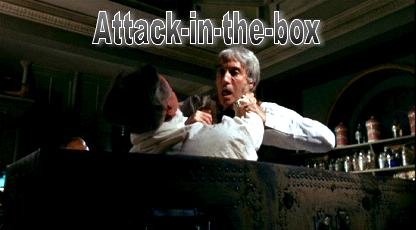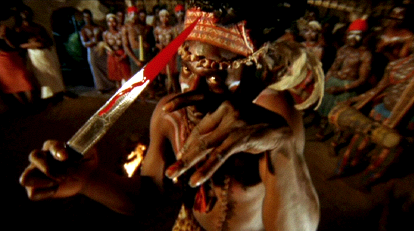Director: Gordon Hessler
Writers: Lawrence Huntington, Christopher Wicking, Michael Reeves (uncredited), Edgar Allan Poe (claiming to be based on the Poe short story, though using only its title)
Producer: Gordon Hessler
Cast: Vincent Price, Alister Willamson, Peter Arne, Christopher Lee, Hilary Dwyer, Carl Rigg, Harry Baird, Godfrey James, Maxwell Shaw, Uta Levka, Sally Geeson, Rupert Davies, Michael Balfour, Danny Daniels, James Mellor, John Barrie, Ivor Dean, John Wentworth, Hira Talfrey, Betty Woolfe, Martin Terry, Anne Clune, Jackie Noble, Jan Rossini, Ann Barrass, Tara Fernando, Zeph Gladstone, Tony Thawnton, Colin Jeavons, Richard Cornish, Anthony Bailey, Martin Wyldeck, Hedger Wallace, Barbara Kellerman, Andreas Malandrinos, the Oh! Ogunde Dancers
On a nineteenth-century African plantation, Englishman Sir Edward Markham (Alister Wiliamson) is subjected to an occult African ritual that has disfigured him and unhinged his mind. His plantation co-owner and brother Sir Julian Markham (Vincent Price) returns him to the family manor in England and keeps him chained in an upstairs room. The mad Sir Edward plots to escape and seek revenge.
The Flashback Fanatic movie review
This was to be the up-and-coming British director Michael Reeves’ follow-up to Witchfinder General. Along with writer Christopher Wicking, Reeves did a lot of reworking on Lawrence Huntington’s original script. However, director Reeves was suffering from drug and mental issues and was replaced early on by Gordon Hessler, who also produced the film. Many lament that not only was young Reeves soon to die from an overdose, but that he did not get the chance to direct The Oblong Box. I think that the project was turned over to a very capable director, as Gordon Hessler gives us a very bleak and unsettling film. Its success convinced AIP to sign Hessler to a three-picture deal to direct more horror films for them.
While having nothing to do with the Edgar Allan Poe short story its title is taken from, The Oblong Box film still manages a Poe-like feel with its nineteenth-century era and its themes of madness, murder, revenge, family sin, and premature burial. It is a convoluted tale of skulduggery that exposes the often-unjust foundations beneath family fortune and reputation. It also reveals the corruption and lack of ethics behind those of the upper crust. Both the aristocracy and the professional class resort to illegal means and exploit the lower class to achieve their ends. All of this scheming and treachery creates conflicts and complications in the lives of the well-to-do that leads to their ruin. Sir Julian Markham suggests that the fate of his brother Edward is retribution. There is plenty of retribution to go around in The Oblong Box.
As in most of the AIP Poe-based films, The Oblong Box stars Vincent Price. His Sir Julian Markham is not an obsessive neurotic like many of his earlier Poe characters, yet he has his share of emotional baggage and ethical lapses. He presents a very dignified and genial front while being able to manipulate and coerce his dishonest lawyer to commit a crime. Two of Markham’s servants are also privy to his scheme. Despite the risks, this is apparently acceptable to those involved, as it will maintain the dignity of the Markham family image.
Price’s beautiful co-star from Witchfinder General, Hilary Dwyer, has a much more wholesome relationship with Price’s character this time around as his betrothed Lady Elizabeth. She helps to make Julian Markham a more sympathetic character rather than just a guilty and entitled aristocrat.
Peter Arne is fine as Samuel Trench, the unethical Markham family lawyer. Trench is instrumental in many of the underhanded shenanigans that result in so many deadly complications. He is also part of the film’s mannered British wit when being offered a drink or ordering tea at the end of scenes involving criminal schemes. He has one of the best moments in the film that typifies director Hessler’s intense and subjective approach to horror. From the mad Sir Edward’s viewpoint, we see a close up of Trench being throttled. Peter Arne’s eyes actually get increasingly bloodshot during this uninterrupted take.
Many horror buffs are stunned that in a film starring those two terror titans Vincent Price and Christopher Lee, the only scene they share is so brief that Lee barely gets out a single word. That nit to pick aside, Lee has terse and amusing scenes with nearly everyone. His Dr. Neuhartt is another unethical professional that unwittingly contributes to the horror to come.
Alister Williamson is both scary and sympathetic as the menace of Sir Edward. Williamson spends most of the film with his ruined face off camera or hidden beneath a crimson hood. Perhaps much of the credit for his performance belongs to the vocal performance of another actor that it is rumored to have dubbed his lines. That voice is rich and distinctive while suggesting the pain and madness that drive his character.
The Oblong Box is one of those films that I appreciate much more after repeat viewings. The intricate and unforeseen consequences of the Markham family crimes and the attempts to maintain class conscious dignity while a madman threatens to destroy it all is very satisfying to this humble and hardworking flashback fanatic. This film also has one of the best finishes that any fright flick could hope for. The direction, dialogue, performances, editing, and music all mesh perfectly to deliver that great last-minute chill.

















No comments:
Post a Comment